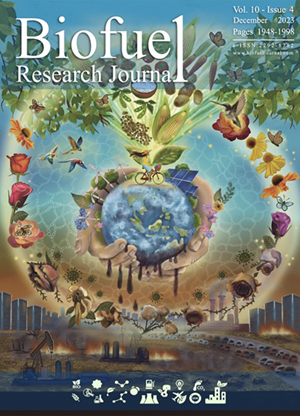生物质气化的能源可持续性分析:综述
IF 14.4
Q1 ENERGY & FUELS
引用次数: 29
摘要
生物质气化技术是一种很有前途的生产稳定气体的工艺,具有广泛的应用,从直接使用到合成增值的生物化学品和生物燃料。由于该技术的高资本/运营成本以及对生物质气化过程中的热能交换进行谨慎管理的必要性,使用先进的可持续性指标来确保环境和其他可持续性因素得到有利解决是很重要的。因此,各种工程技术被用来决定生物质气化过程的内生和外源参数,以找到最有效、可行和可持续的操作和条件。在现有的方法中,火用方法因其在考虑生物质气化系统的性能、成本和环境影响方面的科学严谨性而备受关注。因此,本综述致力于对火用方法在分析生物质气化系统中的应用进行批判性回顾和数值审查。首先,进行文献计量分析,系统地确定基于火用的生物质气化系统可持续性评估的研究主题和趋势。然后,深入研究了生物质组成、反应器类型、气化剂和操作参数对该工艺(火用)效率的影响,并从机理上进行了讨论。与生物质的氧、氮和灰分含量不同,气化过程的火用效率与生物质的碳和氢含量呈正相关。混合的气化介质(CO2和蒸汽)提供了更高的(火用)效率值。在生物质气化系统中,下吸式固定床气化器表现出最高的(火用)效率。最后,概述了分析生物质气化系统可持续性方面的火用方法的机会和局限性,以指导该领域的未来研究。本文章由计算机程序翻译,如有差异,请以英文原文为准。
Exergy sustainability analysis of biomass gasification: a critical review
Biomass gasification technology is a promising process to produce a stable gas with a wide range of applications, from direct use to the synthesis of value-added biochemicals and biofuels. Due to the high capital/operating costs of the technology and the necessity for prudent management of thermal energy exchanges in the biomass gasification process, it is important to use advanced sustainability metrics to ensure that environmental and other sustainability factors are addressed beneficially. Consequently, various engineering techniques are being used to make decisions on endogenous and exogenous parameters of biomass gasification processes to find the most efficient, viable, and sustainable operations and conditions. Among available approaches, exergy methods have attracted much attention due to their scientific rigor in accounting for the performance, cost, and environmental impact of biomass gasification systems. Therefore, this review is devoted to critically reviewing and numerically scrutinizing the use of exergy methods in analyzing biomass gasification systems. First, a bibliometric analysis is conducted to systematically identify research themes and trends in exergy-based sustainability assessments of biomass gasification systems. Then, the effects of biomass composition, reactor type, gasifying agent, and operating parameters on the exergy efficiency of the process are thoroughly investigated and mechanistically discussed. Unlike oxygen, nitrogen, and ash contents of biomass, the exergy efficiency of the gasification process is positively correlated with the carbon and hydrogen contents of biomass. A mixed gasifying medium (CO2 and steam) provides higher exergy efficiency values. The downdraft fixed-bed gasifier exhibits the highest exergy efficiency among biomass gasification systems. Finally, opportunities and limitations of exergy methods for analyzing sustainability aspects of biomass gasification systems are outlined to guide future research in this domain.
求助全文
通过发布文献求助,成功后即可免费获取论文全文。
去求助
来源期刊

Biofuel Research Journal-BRJ
ENERGY & FUELS-
CiteScore
22.10
自引率
1.50%
发文量
15
审稿时长
8 weeks
期刊介绍:
Biofuel Research Journal (BRJ) is a leading, peer-reviewed academic journal that focuses on high-quality research in the field of biofuels, bioproducts, and biomass-derived materials and technologies. The journal's primary goal is to contribute to the advancement of knowledge and understanding in the areas of sustainable energy solutions, environmental protection, and the circular economy. BRJ accepts various types of articles, including original research papers, review papers, case studies, short communications, and hypotheses. The specific areas covered by the journal include Biofuels and Bioproducts, Biomass Valorization, Biomass-Derived Materials for Energy and Storage Systems, Techno-Economic and Environmental Assessments, Climate Change and Sustainability, and Biofuels and Bioproducts in Circular Economy, among others. BRJ actively encourages interdisciplinary collaborations among researchers, engineers, scientists, policymakers, and industry experts to facilitate the adoption of sustainable energy solutions and promote a greener future. The journal maintains rigorous standards of peer review and editorial integrity to ensure that only impactful and high-quality research is published. Currently, BRJ is indexed by several prominent databases such as Web of Science, CAS Databases, Directory of Open Access Journals, Scimago Journal Rank, Scopus, Google Scholar, Elektronische Zeitschriftenbibliothek EZB, et al.
 求助内容:
求助内容: 应助结果提醒方式:
应助结果提醒方式:


